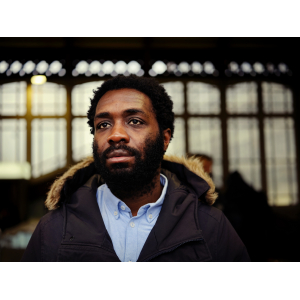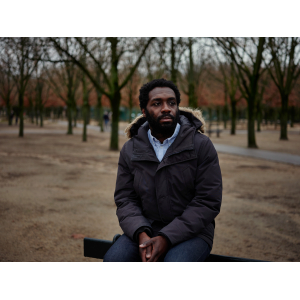Cédric DJEDJE
Stage director
Cédric received a creative grant to produce his play Vielleicht.
What is your artistic background?
I started acting in my early twenties, initially as a hobby while studying psychology, for two or three hours a week. Then I became passionate about acting and it took more and more of my time. I took classes at the Conservatoire du 7ème arrondissement (about ten hours) then at the Studio Théâtre d'Asnières (about twenty hours) then at the Haute Ecole de Théâtre de Suisse Romande in Lausanne (about thirty hours) and for about ten years now I’ve been a professional actor in Switzerland and France. I mainly do theatre, but I’ve also played in two TV series (Helvetica and Hors-Saison) and a film (Fauves). Finally, in my practice, I try to think/experiment around the notion of the collective. By initiating projects like Vielleicht with the company Absent.e for the moment (whose team is great and whose names I think are important to mention: Noémi Michel, Diane Muller, Juline Michel, Joana Oliveira, Nathalie Anguezomo Mba Bikoro, Ludovic Chazaud, Safi Martin Yé, Lionel Perrinjaquet, Tara Mabiala, Ivan Larson) and by being part of a collective called the Collectif Sur Un Malentendu. Ps: For those who are interested to have more info about my journey, I left my psychology studies somewhere between the Studio Théâtre d'Asnières and the Manufacture.
How do you view your profession today?
I am currently going through contradictory feelings about my profession. I would like to clarify what I mean by focusing on the French-speaking part of Switzerland, my place of theatrical practice. Hit hard by the pandemic, I have the impression that the theatrical milieu is in a moment of intense questioning as to its place, its "usefulness" and its relationship to recent societal upheavals. As a result of these different elements, certain questions have gained new intensity: how can we find new ways of doing politics rather than automatically thinking of ourselves as political because we are artists? How to reinvent our relationship to politics off the stage? How to undo hierarchical production relationships? How to guarantee care (physical and psychological) at work? How to set up tools to detect and fight against toxic behaviours? How to fight against the different types of harassment in the workplace? Far from remaining at the stage of good intentions, these questions have led to concrete attempts and initiatives. I really feel aligned with these questions and the various implementations or attempts at implementation. However, I also see a glaring lack of ethnic diversity on set, like an appointment not yet really made with political mobilizations such as Black Lives Matter. To put it another way, I find that things are moving very slowly and that imaginations are struggling to decolonize. But there is still movement, notably due to the combined action of powerful stage creations by Afrodescendant artists (Safi Martin Yé, Kayije Kagame, Ramaya Tegegne, Soraya Lutangu, to name but a few), initiatives such as the open letter of the Black artists and cultural workers in Switzerland, and a new generation of artists who are more sensitive and aware of these issues (and of course a few artists of other generations).
How do you see yourself in five years? In 10 years?
Firstly, I see myself continuing in this profession with the Collectif Sur Un Malentendu! Second, I hope to continue this work by being part of more collectives or forms of collective organization that question modes of production and organization. I see myself continuing in/with collectives or collective forms that bring artistic disciplines into dialogue with theoretical disciplines (critical political theories, postcolonial theories, sociology, history...). Finally, in five or 10 years time, I see myself experimenting in collectives or collective forms that question or try to find new spaces for representation, collectives or collective forms whose compositions are more diverse in terms of origins (social and ethnic).
This interview was conducted in 2022
Photography credit: Julie Glassberg


